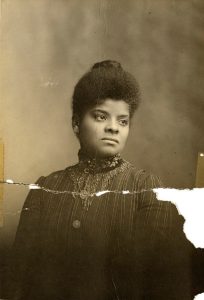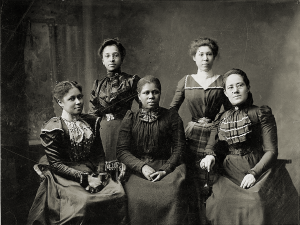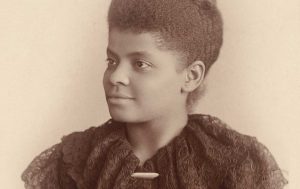
Ida B. Wells was a Black journalist, civil rights advocate, and feminist. She was born into slavery in Holly Springs, Mississippi as the oldest daughter of James and Lizzie Wells. Her parents died of yellow fever, leaving her to support her younger siblings. She found work as a teacher then she later on moved to Memphis where she became a leading journalist and civil rights activist.

At only 21 years old, Wells had an altercation with a white train conductor who ordered her to move from the ladies’ car to the Black car even after she’d bought a first-class ticket. The conductor eventually tried forcibly removing her from her seat, but she refused and bit his hand. Wells was thrown out of the train and retaliated by suing them in a case she would later win; the decision was later reversed in court. Wells’ conflict illuminates the precarious situation black women find themselves in as beings who do not fit in the white-occupied ladies’ car or the male-dominated Black car, and it also exposes the nature of a particular second class citizenship that doesn’t include protection under the law.

In 1892, Wells turned her attention to anti-lynching after a friend and two of his business associates were murdered. Tom Moss, Calvin McDowell, and Will Stewart started a grocery store, which drew customers away from a white-owned store in the neighborhood. The white store owner, along with a mod of other men, clashed with Black store-owners on numerous occasions. On a night when they were guarding the store, they were attacked by White assailants and shot a few of them. They later were arrested and held in jail without due process which allowed for a lynch mob to kidnap and murder them. Wells wrote editorials decrying the lynching and risked her own life traveling throughout the south to gather and share information on the realities of lynchings and motives behind them.

Wells was an active fighter for woman suffrage, particularly for Black women. On January 30, 1913 Wells founded the Alpha Suffrage Club in Chicago. The club organized women in the city to elect candidates who would best serve the Black community. As president of the club, Wells was invited to march in the 1913 Suffrage Parade in Washington, DC along with dozens of other club members.

Wells’ patriotism combines advocacy, coalition building, sacrifice, and a return to fundamental American values. She made lynchings a national conversation by weaving in rights that Black folk were denied which include the right to free speech, self-defense, and a free market. White southerners and white America as a whole acted in direct opposition to these values as they created censored certain material, and lynched Black people, and created monopolies. Through her writing and organizing Wells holds a mirror up to white America to show not only what it means to be an American, but what it means to be a patriot.
